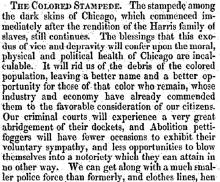FLIGHT OF FUGITIVES FROM ILLINOIS.
The Stampede for Canada— Scenes of the Dept. &c.
The utmost consideration prevails among all (illegible) of the colored residents of the city and the exodus from a state of uncertainty to one of the absolute freedom still continues. All day, yesterday, the vicinity of the Michigan Southern depot was a scene of excitement and confusion. After the religious service at the Zion Baptist Church in the morning, which was decently attended, the slave-taking commenced. Eidos Place, Buffalo, Clark and Harrison streets, which were largely, inhabited by the colored population, were crowded all the afternoon by the fugitive and their friends, going from door to door, hugging each other good bye, and (illegible). The colored clergyman of the city were also among the number, and labored (illegible) is attending encouragement and commission to them about to depart. Sorrowful groups of men, women and children gathered in the (illegible) yards and upon the sidewalks, and many affecting scenes occurred. In some instances entire families were going together, in which (illegible) there assumed to be a general jubilation; in others a few members, a with having a (illegible), or a mother her children, said were and promises od (illegible) recollection until a good time coming. Upon the art of all affective as they consider their dispensation, there seemed to be a general and decided belief that the day of their emancipation from trouble was neat at hand.
As the hour of departure— half- past six— drew night, the streets adjacent to the depot and the immediate vicinity of the four cars, near the corner of Harrison and Griswold streets, were thronged with an excited multitude of colored people of both sexes and all ages. Large numbers of white people also gathered from motive of curiosity, and stood silent spectators of this rather unusual spectacle. The four cars were rapidly filled with the fugitives, numbering 106 in all, and embracing men, women, youth and infants. In the rear care were two or three sick women, who were treated with the utmost tenderness, and made the recipients of every attention possible to alleviate their hard a lot. The whole business of the transportation was supervised by two or three colored men, assisted by several white people.
After all were abroad, which was concluded by six o’clock, the imminence crowd pressed up to the cars and commenced the last farewell. The general appearance of all— both of those going and those staying— was one of joy at the expected deliverance from uncertainty, which might at any hour return them to a bondage they had escaped. Here and there was one in tears and wringing the hands, but the majority were in the best of humor, and were congratulated by their friends listening behind. That tomorrow they would be free. “Never mind,” said one, “ the good Lord will save us all in the coming day.” Another was encouraging a weeping woman and urging her not to cry, but thank God she had a place to go to out of the way of the slave-catchers. These and like congratulations were interchanged, and as one crowd finished, their places were supplied by a fresh delegation from the outside multitude, who also went through their congratulations and hand-shaking, bidding their friends write when they got to “the other side of Jordan,” and not forget them in the country. The minister of the neighboring church where they had attended also went from car to car, bidding them be men when they got to Canada.
The larger proportion of the fugitives were stout, able-bodies young men, many of them well-dressed and (illegible) of them almost white. These apparently were light-hearted, and looked forward to their night’s ride, albeit under privations and difficulties with a large degree of pleasure and good nature, some of them seeming to enjoy it as good joke. The elder ones evinced to levity, but acted like those who had been hardened by troubles, and were now suffering a lot foreseen and prepared for. In every case they stoically bade their friends good bye, each expressing a hope of a good time coming, a belief which seems deeply implanted in the breasts of all said one of them, and old man, about seventy, to another of a like age, who was to remain, “Ah! Johnasing, Johaning, de road must turn; it’s ‘about done gone!” The women more frequently gave way to their troubles, but upon the encouragement of their friends would soon become buoyant and light- hearted, and attempt to laugh off their troubles. Quite a number of children were among the crowd, who ignorant of the cause of such a commotion, gave the rest constant trouble by getting into the wrong cars, and climbing round between the wheels.
But all were finally stowed away, the bell of the engine sounded, and the train started amid lusty cheers, many-voiced good byes, and the waving of hats and handkerchiefs as far as the eye could see. The fugitives heartily responded, and the train vanished in the distance.
About one thousand fugitives have arrived in this city since last fall, a large number of whom have left within the past few days. It is evidently the wisest course for them to purpose, as it is sheer folly for them to remain where they were in imminent danger of boing return to slavery. – Chicago Journal, 8th ult.
"Flight of Fugitives from Illinois," Boston (MA) Liberator, May 3, 1861, p. 4.

